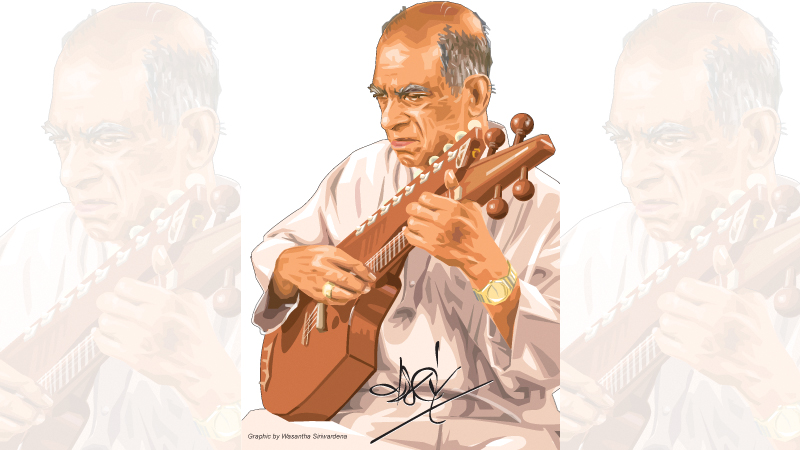As usual, it ran in Amaradeva’s family. “My father used to craft and play violins. My mother sang hymns. The beauty was my father being a Buddhist and mother a Christian. My elder brother taught me Indian classical music. I strummed the violin sometimes when mother sang hymns,” Amaradeva traced his roots.
The maestro belonged to the rare calibre of musicians who can express well. His sophisticated expression betrays his somewhat authoritative knowledge of literature as well as bilingualism. In both Sinhala and English, Amaradeva would articulate his thoughts of intellect in a soft cadence. To see him perform with his unique music instrument now and then was familiar in such instances.
When humans reach divinity, they achieve what deities cannot: immortality. Prof. Ediriweera Sarachchandra knew that Wannakuwattavaduge Don Albert Perera would make a timeless journey that will make him immortal in many centuries to come. And thus Albert Perera was baptized as Amaradeva, immortal deity.
Prof. Sarachchandra and the then Lankadeepa Editor D.B. Dhanapala, who detected Amaradeva’s unsurpassable capacity, were instrumental in sponsoring him to further studies in India by setting up a fund. Amaradeva’s baptism took place just before leaving for Bhatkande University, which turned out a touchstone in his life later on.
 Ashokamala’s music director Mohamed Ghouse recognised Amaradeva as the best violinist in his orchestra. Sri Lankan cinema’s second talkie Ashokamala is not only Amaradeva’s starting point as a cinema musician, but also as an actor. He could have been the most senior actor alive before the early hours of November 3, since none of the Kadavunu Poronduva (the first talkie) cast is alive today.
Ashokamala’s music director Mohamed Ghouse recognised Amaradeva as the best violinist in his orchestra. Sri Lankan cinema’s second talkie Ashokamala is not only Amaradeva’s starting point as a cinema musician, but also as an actor. He could have been the most senior actor alive before the early hours of November 3, since none of the Kadavunu Poronduva (the first talkie) cast is alive today.
If Ananda Samarakone and Sunil Santha could set the platform for a new consciousness in local music, Amaradeva continued the process. His early music compositions were influenced largely by Ananda Samarakone. This influence was very much useful when Amaradeva joined the Radio Ceylon in the 1960s to moderate a number of innovative programs.
Young Amaradeva met Sunil Santha at one of the legendary vocalist’s concerts. That acquaintance led Amaradeva to Chitrasena studios. And that brief encounter was to have a lasting impact on Sinhala culture.
Amaradeva was not confined to oriental forms. He tried his hands on Western harmonies and counter harmonies and at times he fused it with oriental music forms. His voice has that powerful capacity to breathe life into poetry. Celebrated poems like Ma Mala Pasu and Sinidu Sudu Muthu flourish with life familiar in our realms, when Amaradeva sings in his exceptional voice. Poets such as Mahagama Sekara, Madawala S. Rathnayaka and Sri Chandraratne Manawasinghe could get the best of him.
Even at 88, Amaradeva’s thoughts had been clear and precise. His voice will continue to retain the same slow rhythm in its own weight.
After six years since his passing, the legacy of the great maestro still lives on.
****
Filmography at a glance
1963 Gamperaliya
1964 Getavarayo
1965 Saravita
1966 Delovak Atara
1967 Ransalu
1970 Akkara Paha
1970 Lasseta Kodiya
1970 Tun Man Handiya
1976 Madol Doowa
1988 Sagara Jalaya Madi Henduva Oba Sanda
Awards and accolades
2003: Officier (officer) in the Ordre des Arts et des Lettres (Order of Arts and Letters) from the French government
2001: The Ramon Magsaysay Award of the Philippines
1998: Title of Deshamanya from the government of Sri Lanka
1991: First doctorate from the University of Kelaniya.
1986: Title of Kala Keerthi from the government of Sri Lanka
Padma Sri Award from India
From the citation of Ramon Magsaysay Award
A prodigious creative artist, Amaradeva has composed music for ballet, film, the stage, and countless radio and television programs. He has written over one thousand songs-melodious, lyrical, haunting songs of patriotism, beauty, faith, passion, and love.
For over fifty years now he has also been performing his songs over radio and television, in concert, and on gramophone records, audiotapes, and CDs. Amaradeva’s fluid, resonant voice long ago overshadowed his violin. Today, Sri Lankans need only turn on their radios to hear it daily. “He sings so beautifully,” says one admirer, “one has to stop everything and listen.”
Music, says Pandith Amaradeva, “is the finest of the fine arts.” His music is both very fine and widely loved. Sri Lankans say it is music that transcends ethnicity, class, and age. Or as his friend Ediriweera Sarachchandra put it, it is music that “speaks to the soul of the nation.”
In electing K. W. D. Amaradeva to receive the 2001 Ramon Magsaysay Award for Journalism, Literature, and Creative Communication Arts, the board of trustees recognises his life of dazzling creativity in expression of the rich heritage and protean vitality of Sri Lankan music.




